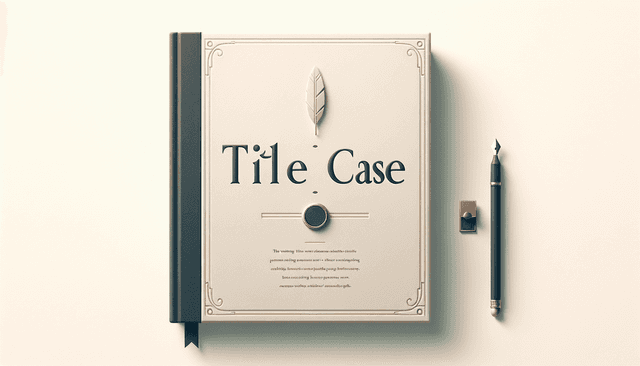Table of Contents
Have you ever found yourself staring at a title, wondering if “Your” should be capitalized? You’re definitely not alone. Title casing can be tricky, and who wants to look foolish by getting it wrong, especially in a professional setting?
But don’t worry! If you stick around, I promise you’ll walk away with a solid understanding of title case rules, including when to capitalize “your.” We’ll break it all down in a way that’s super easy to digest.
From the nitty-gritty of capitalization rules to practical tips for writing killer titles, we’ve got you covered. Let’s dive in and clear up the confusion!
Key Takeaways
- In title case, major words are capitalized while smaller words like articles and conjunctions are usually lowercase unless they are the first or last word.
- Pronouns, verbs, and adjectives should be capitalized, including the word “your” since it’s a pronoun that indicates ownership.
- Use examples like “How to Improve Your Writing Skills” to understand proper title capitalization.
- Differing styles, such as APA or Chicago, have specific capitalization rules to follow, so be aware of format guidelines.
- Utilize tools like TitleCase.com to check your title’s capitalization and experiment with various title options for better results.

Understanding Title Case Rules
Title case is a capitalization style used in writing titles, headlines, and certain other textual elements.
The main rule? Capitalize the major words in a title, while keeping smaller words like articles, prepositions, and conjunctions in lowercase unless they start or end the title.
Following title case rules not only makes your writing look polished, it helps readers navigate through your content more easily.
Capitalization of Specific Words
In title case, understanding which words to capitalize can be tricky.
Articles (“a,” “an,” “the”), conjunctions (“and,” “but,” “or”), and prepositions (“in,” “on,” “with”) are generally not capitalized unless they are the first or last word of the title.
On the flip side, pronouns like “your,” verbs, and adjectives should be capitalized.
This means that words that perform crucial roles in conveying meaning should stand out, while the smaller connectors remain low-key.
The Role of ‘Your’ in Title Case
So, is “your” capitalized in a title? Yes, it is.
“Your” is a pronoun, and like other pronouns, it should be capitalized in title case.
Since it conveys ownership and personal connection, giving it capital letters aligns with the general rule for pronouns in titles.
Every time you write a title that includes “your,” remember it’s a crucial player that deserves its spotlight.
Examples of Title Capitalization
Examples can help solidify the rules of title capitalization.
For instance, the title “How to Improve Your Writing Skills” demonstrates the capitalization of “Your,” following title case rules.
Conversely, a title like “the quick brown fox jumps over the lazy dog” is not correctly capitalized since it disregards the major word capitalization.
When it comes to different styles, titles may also vary in capitalization rules across formats, such as APA, Chicago, or MLA. Each has specific guidelines that can clarify your title’s formatting.

Common Questions About Title Capitalization
When it comes to title capitalization, people often have lingering questions.
One common question is whether all words should follow the same rules, and the answer is no—there are exceptions based on word types.
For instance, while pronouns, verbs, and adjectives are capitalized, smaller words like articles and conjunctions are typically not, unless they are the first or last word in the title.
Another frequently asked question involves specific phrases or compound words. Are titles like “To Kill a Mockingbird” correctly formatted? Yes, because major words are capitalized, including “To,” as it starts the title.
Some might wonder how to handle hyphenated words. In that case, generally, capitalize the first element in the compound term, such as “Well-Being” or “High-Quality.”
Finally, if you’re unsure about your title, many online resources and guides can clarify odd cases, making it easier to craft titles with confidence.
Practical Tips for Writing Titles
Now that we’ve covered the rules, let’s talk practical tips for crafting titles effectively.
First, consider using tools for checking title case. Websites like TitleCase.com make it easy to test your titles and see how they stack up against capitalization norms.
Second, keep your titles concise but descriptive. A great title captures the essence of your content without overwhelming readers.
Third, stick to the point. Avoid filler words and focus on what truly matters to grab your audience’s attention.
It’s also a good practice to keep the intended audience in mind. Tailor your language and style to what will resonate with them.
Finally, brainstorm multiple title options. Sometimes the first idea isn’t the best, so think outside the box and explore variations.
When you follow these tips, you’ll be more equipped to write effective titles that pop and adhere to the rules of title capitalization.

Conclusion and Key Takeaways
In wrapping up our exploration of title case, let’s recap the key points.
Understanding title case rules sets a solid foundation for effective title writing.
Major words are typically capitalized, while smaller functional words like articles and conjunctions remain in lowercase unless they are the title’s first or last word.
Recognizing that “your” is a pronoun means it is always capitalized in title case, highlighting its significance in conveying ownership.
Examples help clarify these rules, showing how correct and incorrect capitalization can change the perception of your title.
As we’ve noted, there are many common questions surrounding title capitalization that can lead to misunderstandings.
Knowing the exceptions and variations can boost your confidence when writing titles for all sorts of content.
Practical tips, such as using online tools and brainstorming different title options, can enhance your title writing efforts.
In conclusion, keeping these capitalization rules and practical strategies in mind will elevate your writing and ensure clarity in your titles.
Polishing your titles makes a difference, not just for aesthetics but for reader engagement as well.
So next time you sit down to create a title, remember: capitalization matters!
FAQs
Yes, “your” is capitalized in title case. As a pronoun, it is treated like nouns and major words in titles, ensuring proper emphasis and recognition in title formatting.
Yes, exceptions exist. Articles, conjunctions, and prepositions are typically not capitalized unless they start or end the title. Context may allow for variation in certain styles or specific guidelines.
Utilize tools like title case converters, be consistent with style guides, and ensure clarity and conciseness. Avoid unnecessary filler words to enhance readability and impact.
Different title styles, like APA or MLA, have unique rules. Some may capitalize fewer words than others. Understanding these variations is critical for adhering to specific formatting guidelines in writing.



